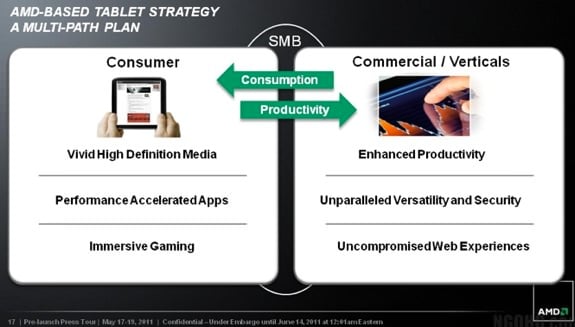Find Our Latest Video Reviews on YouTube!
If you want to stay on top of all of our video reviews of the latest tech, be sure to check out and subscribe to the Gear Live YouTube channel, hosted by Andru Edwards! It’s free!
Wednesday June 1, 2011 2:51 pm
AMD looking to enter tablet game with their Densa chip

Is Advanced Micro Devices finally making a major push into the tablet market? That's the signal sent by leaked product roadmap slides showing plans for an AMD tablet chip codenamed Desna that surfaced on NGOHQ.com last week.
The slides don't offer any specs for AMD's Z-Series accelerated processing unit, or APU, nor do they name a release date other than the heading "2011 AMD HD Tablet Platform Overview."
Here's what we do know. AMD thinks Desna is well-suited for both consumer media tablets and devices built for business use. The chip maker is playing up its graphics prowess with promises of "smooth streaming HD video," AdobeFlash 10.2 acceleration, Microsoft Office 10 visual enhancements, and support for DirectX 11 and Windows 7 Effects.
Desna also runs accelerated HTML 5 and Internet Explorer 9, while "leveraging the Microsoft Windows application base," which sounds a bit like AMD saying, "we don't actually have an app store for this chip."
The Z-Series platform's commercial play seems to be summed up with promises of "full integration and support in IT environments," "unparalleled versatility and security," and "enhanced productivity."
Whether AMD's "ultimate HD tablet" chip finds purchase with device makers remains to be seen. So far, the vast majority of media tablets shipped since Apple reinvented the category with its iPad feature chips based on the ARM architecture. AMD and its larger rival Intel, the two biggest makers of x86-based chips, have yet to find any real tablet success.
AMD does have one model to follow, however. Another rival, Nvidia, has married its graphics processor technology with an ARM-based CPU in its Tegra tablet platform. Tegra's been a big hit with many tablet makers not named Apple.
Can AMD do the same with its Fusion APUs, which also closely integrate both CPU and GPU computing power? The x86 architecture AMD uses on the CPU side has drawbacks that have caused tablet makers to largely pick ARM chips for their devices—higher; power draws and thermals, relatively short battery life, and slower boot times being principle x86 features that device makers find unappealing.
But AMD has been getting its thermals down to tablet-type ranges with its latest embedded APUs. And come to think of it, there's nothing on the leaked slides that says Desna has an x86 CPU.
ARM vice president of technology Jem Davies is keynoting AMD's upcoming Fusion Developer Summit and that's led to speculation that AMD could take a stab at the tablet market with an ARM license of its own.
The slides featuring Desna were actually just a small part of the overall leaked roadmap.
Other slides detailed AMD's upcoming Fusion platforms for notebooks of varying sizes, desktops, all-in-on PCs, and embedded systems. One big reveal is AMD's claim that its new "Llanno"-based notebook platforms add a whopping 3.5 hours of battery life to the 6.5 hours the 2010 platforms delivered.
AMD is calling that extra battery life "AllDay Power."
Another slide has a pair of pie charts showing what is presumably the use of real estate on Intel's Sandy Bridge chips as compared with AMD's Llano parts. The Sandy Bridge CPUs devote slightly more than half of the die to x86 cores and cache, with about a third going to "uncore" transistors (L3 cache, bus controllers, etc.), and maybe a fifth of die space dedicated to graphics processing.
AMD's A-Series Llano dies, by way of contrast, are roughly equal parts x86 CPU and cache, GPU, and Northbridge (pretty much what Intel calls the "uncore," just to make things confusing).
The following slide lays out just what kind of computing power AMD says it is squeezing onto its 226-sq.-mm A-Series APUs with power draws of between 35 and 45 watts. Three separate chips on previous-generation AMD platforms are combined in those next-generation APUs: A 66-sq.-mm, 13-watt Northbridge, a 200-sq.-mm., 45-watt, quad-core CPU, and finally, a discrete-class DirectX 11-compatible GPU measuring in at 108 sq. mm and drawing 26.3 watts.
AMD should be making some or all of the information in the leaked roadmap official at the ongoing Computex show in Taiwan and at its own Fusion Developer Summit later in June.
This article, written by Damon Poeter, originally appeared on PCMag.com and is republished on Gear Live with the permission of Ziff Davis, Inc.











